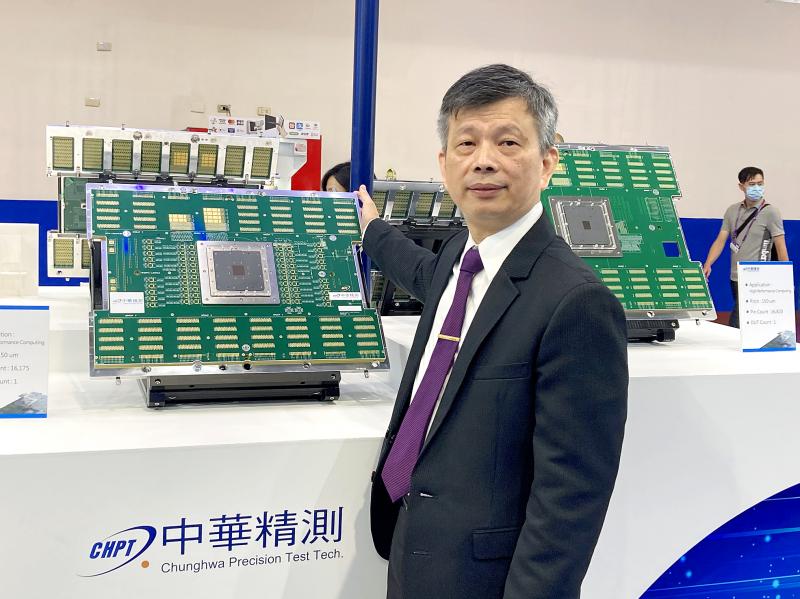Chunghwa Precision Test Technology Co (CHPT, 中華精測), a supplier of probe cards used for silicon wafer testing, is cautiously optimistic about its business outlook for next year, bolstered by robust demand for vertical probe cards (VPC) and testing demand for high-performance-computing (HPC) chips, a company official said yesterday.
Revenue from the high-margin VPC business is expected to grow by a double-digit percentage next year compared with this year, which would boost VPC’s contribution to more than 25 percent of overall revenue, CHPT president Scott Huang (黃水可) told reporters on the sidelines of a media briefing in Taipei.
The company reported NT$1.06 billion (US$36.16 million) in revenue last quarter, with VPC accounting for 22 percent.

Photo: Lisa Wang, Taipei Times
“We are cautiously optimistic about next year’s business,” Huang said. “The main growth drivers are VPC and HPC.”
CHPT plans to boost its needle planting machines’ monthly capacity by more than 66 percent before the end of the year to 1 million pins from 600,000 pins now, Huang said.
Testing demand for 5G-related chips are also on the rise, as 5G smartphone production is forecast to surge to more than 500 million units next year from an estimated 206 million units this year, he said.
CHPT is also gaining new customers in other fields, as a growing number of companies worldwide are attempting to develop their own chips, he added.
CHPT said it has a good chance to break into the world’s top 10 probe card suppliers this year, after ranking 18th last year.
Asked about order losses from Huawei Technologies Co (華為) due to the US’ export restrictions, Huang said that orders from new customers would fill the void left by the Chinese company, although the adjustments might take some time.
CHPT counts the world’s two major 5G chip suppliers — Qualcomm Inc and MediaTek Inc (聯發科) — among its top clients.
Taiwan Semiconductor Manufacturing Co (台積電), the sole chip supplier to Apple Inc’s iPhone series, is also a customer.
Gross margin rose to 54.1 percent last quarter, from 52.6 percent in the first quarter and 51.9 percent in the second quarter of last year, company data showed.
Gross margin next year is forecast to range between 50 and 55 percent, Huang said.
CHPT said that it set up a smart automation business group earlier this month.
The company is showcasing its smart manufacturing solutions using artificial intelligence technology at the three-day through today in Taipei.

China’s Huawei Technologies Co (華為) plans to start mass-producing its most advanced artificial intelligence (AI) chip in the first quarter of next year, even as it struggles to make enough chips due to US restrictions, two people familiar with the matter said. The telecoms conglomerate has sent samples of the Ascend 910C — its newest chip, meant to rival those made by US chipmaker Nvidia Corp — to some technology firms and started taking orders, the sources told Reuters. The 910C is being made by top Chinese contract chipmaker Semiconductor Manufacturing International Corp (SMIC, 中芯) on its N+2 process, but a lack

TECH BOOST: New TSMC wafer fabs in Arizona are to dramatically improve US advanced chip production, a report by market research firm TrendForce said With Taiwan Semiconductor Manufacturing Co (TSMC, 台積電) pouring large funds into Arizona, the US is expected to see an improvement in its status to become the second-largest maker of advanced semiconductors in 2027, Taipei-based market researcher TrendForce Corp (集邦科技) said in a report last week. TrendForce estimates the US would account for a 21 percent share in the global advanced integrated circuit (IC) production market by 2027, sharply up from the current 9 percent, as TSMC is investing US$65 billion to build three wafer fabs in Arizona, the report said. TrendForce defined the advanced chipmaking processes as the 7-nanometer process or more

NVIDIA PLATFORM: Hon Hai’s Mexican facility is to begin production early next year and a Taiwan site is to enter production next month, Nvidia wrote on its blog Hon Hai Precision Industry Co (鴻海精密), the world’s biggest electronics manufacturer, yesterday said it is expanding production capacity of artificial intelligence (AI) servers based on Nvidia Corp’s Blackwell chips in Taiwan, the US and Mexico to cope with rising demand. Hon Hai’s new AI-enabled factories are to use Nvidia’s Omnivores platform to create 3D digital twins to plan and simulate automated production lines at a factory in Hsinchu, the company said in a statement. Nvidia’s Omnivores platform is for developing industrial AI simulation applications and helps bring facilities online faster. Hon Hai’s Mexican facility is to begin production early next year and the

Who would not want a social media audience that grows without new content? During the three years she paused production of her short do-it-yourself (DIY) farmer’s lifestyle videos, Chinese vlogger Li Ziqi (李子柒), 34, has seen her YouTube subscribers increase to 20.2 million from about 14 million. While YouTube is banned in China, her fan base there — although not the size of YouTube’s MrBeast, who has 330 million subscribers — is close to 100 million across the country’s social media platforms Douyin (抖音), Sina Weibo (新浪微博) and Xiaohongshu (小紅書). When Li finally released new videos last week — ending what has